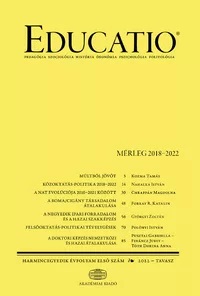Rejtett tanterv a változó tanulási környezetben
Hidden Curriculum in a Changing Learning Environment
Author(s): László Tamás SzabóSubject(s): Education
Published by: Akadémiai Kiadó
Keywords: hidden curriculum; traditional vs. mediated teaching/learning environment
Summary/Abstract: Due to globalization as civilization feature in developed world teaching and learning have to face radically new conditions. This paper deals with this problem area, that is what kind of influences form education and training in the new environment, in formal and infomal (leisuretime) context as well. Hidden curriculum represents the point of view to treat phenomenons belonging to frames mentioned above. The hidden curriculum as metphore in professional literature has two meanings: partly it is seen as source of effects (implicit curriculum, unstudid curriculum, non-planned curriculum) furthermore as products of these ones, containing all secondary effect of schooling, generated as non intentional side result of teaching and schooling (tacit knowleged, school life rituals, non verbalized rules of behavior.) These concern such issues as knowlege, attitude, habit, ways of action and reaction These phenomenons are formed and generated during long experiences in formal and informal teaching/learning settings. Expansion of images, that is language of visuality goes parallel with language of words. Education in global contest needs global competencies. From this point of view studies treating school life of our schools during pandemic period show not consoling situation. Nevertheless there are initiatives, teaching and supporting methodical materials as well. Positive and negative products due to hidden curriculum are taken into account in the paper. To mention but a few: perception speed, focused and dispersed attention, new type teacher role, partnreship teacher-pupil of new type. Furthermore such topics of professional literutre as particularities of new type identities and communities are critically mentioned in the paper.
Journal: Educatio
- Issue Year: 31/2022
- Issue No: 4
- Page Range: 633-646
- Page Count: 14
- Language: Hungarian

